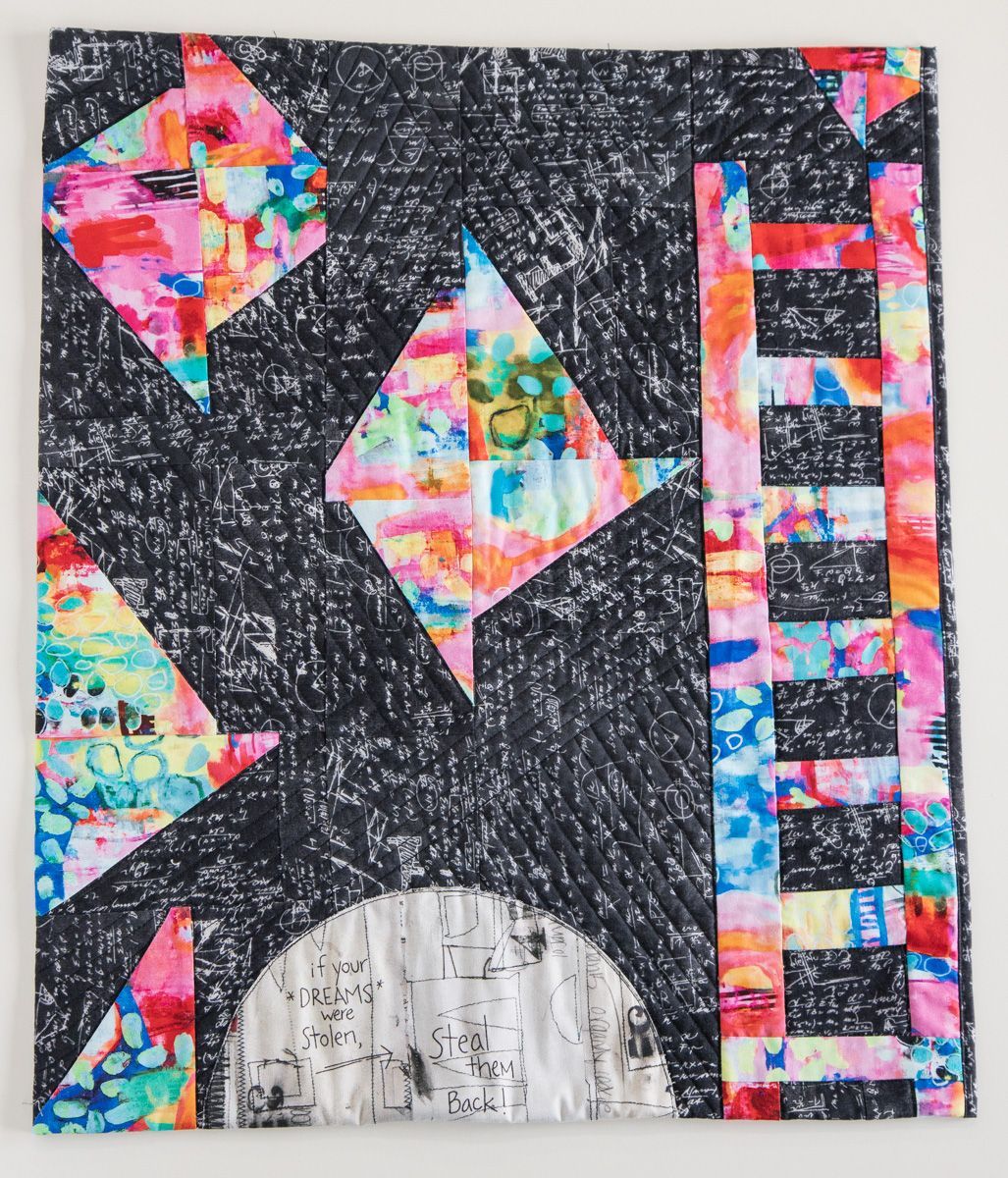Substance Abuse (Steals Your Dreams)

20x23in, quilter’s cotton (machine-pieced and quilted), created in 2023, NFS
This quilt is meant to represent substance use disorders. Substance use disorder (SUD) is a treatable mental disorder that affects a person’s brain and behavior, leading to their inability to control their use of substances like legal or illegal drugs, alcohol, or medications. Symptoms can be moderate to severe, with addiction being the most severe form of SUD. Substance use disorders occur when the recurrent use of alcohol and/or drugs causes clinically significant impairment, including health problems, disability, and failure to meet major responsibilities at work, school, or home.
What to look for: The improvisationally pieced nature and colors of this mini quilt was originally a playful attempt to sew a ladder (seen on the right side). It led to a mental exploration of what the ladder represented (hope), where the ladder is coming from (addiction), and where it is going (dreams and goals). Further sewing created this piece. The words written below on the “moon” are a play on the lyrics of a song called “Bolt Cutter.” It was created close in time to the schizophrenia quilt.
Book recommendation(s): These books are not meant to replace medical intervention and/or skilled therapy.
The Mindfulness Workbook for Addiction: A Guide to Coping with Grief, Stress, Anger That Trigger Addictive Behaviors. https://a.co/d/5xAqELt
Addiction in the Family: Helping Families Navigate Challenges, Emotions, and Recovery https://a.co/d/iI1QyRR
From SAMSHA (Substance Abuse and Mental Health Services Administration:
Mental health and substance use disorders affect people from all walks of life and all age groups. These illnesses are common, recurrent, and often serious, but they are treatable and many people do recover. Mental disorders involve changes in thinking, mood, and/or behavior.
These disorders can affect how we relate to others and make choices. Reaching a level that can be formally diagnosed often depends on a reduction in a person’s ability to function as a result of the disorder. For example:
- Serious mental illness is defined by someone over 18 having (within the past year) a diagnosable mental, behavior, or emotional disorder that causes serious functional impairment that substantially interferes with or limits one or more major life activities.
- For people under the age of 18, the term “Serious Emotional Disturbance” refers to a diagnosable mental, behavioral, or emotional disorder in the past year, which resulted in functional impairment that substantially interferes with or limits the child’s role or functioning in family, school, or community activities.
- Substance use disorders occur when the recurrent use of alcohol and/or drugs causes clinically significant impairment, including health problems, disability, and failure to meet major responsibilities at work, school, or home.
From NIMH (National Institute for Mental Health):
Substance use disorder (SUD) is a treatable mental disorder that affects a person’s brain and behavior, leading to their inability to control their use of substances like legal or illegal drugs, alcohol, or medications. Symptoms can be moderate to severe, with addiction being the most severe form of SUD.
People with a SUD may also have other mental health disorders, and people with mental health disorders may also struggle with substance use. These other mental health disorders can include anxiety disorders, depression, attention-deficit hyperactivity disorder (ADHD), bipolar disorder, personality disorders, and schizophrenia, among others.
When someone has a SUD and another mental health disorder, it is usually better to treat them at the same time rather than separately. People who need help for a SUD and other mental disorders should see a health care provider for each disorder. It can be challenging to make an accurate diagnosis because some symptoms are the same for both disorders, so the provider should use comprehensive assessment tools to reduce the chance of a missed diagnosis and provide the right treatment.
It also is essential that the provider tailor treatment, which may include behavioral therapies and medications, to an individual’s specific combination of disorders and symptoms. It should also take into account the person’s age, the misused substance, and the specific mental disorder(s). Talk to your health care provider to determine what treatment may be best for you and give the treatment time to work. HOME DETOX CAN BE DANGEROUS AND EVEN DEADLY, seek medical support.
Resources:
Click here for a 15min video on how almost everything you think you know about addiction is wrong.
Click here to watch a 10min video about a personal story of how addiction is a disease.
Learn more about this diagnosis at the National Institute for Mental Health.

All Rights Reserved | Creator's Wellbeing